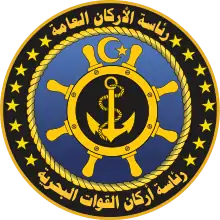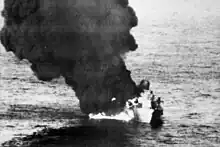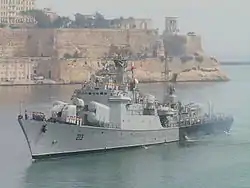| Libyan Navy | |
|---|---|
| القوات البحرية الليبية | |
 Seal of the Libyan Navy | |
| Active | November 1962 – present |
| Country | |
| Allegiance | Government of National Unity (pro-GNU) House of Representatives (pro-HoR) Formerly Government of National Accord |
| Branch | Libyan Armed Forces |
| Type | Navy |
| Size | 15,000 personnel |
| Headquarters | Tripoli (Libyan Army) Tobruk (Libyan National Army) |
| Equipment | 1 frigate 1 corvette 1 missile boat 2 minesweepers 2 landing crafts |
| Engagements | Action in the Gulf of Sidra (1986) 2011 Libyan civil war Second Battle of Zawiya Second Libyan Civil War Battle of Sirte (2016) 2019-2020 Western Libya campaign |
| Commanders | |
| Commander-in Chief | Mohamed al-Menfi |
| Chief of Naval Staff | Abdul Hakim Abu Hawliyeh (pro-GNU)(formerly pro-GNA) [1] Admiral Faraj al-Mahdawi (pro-HoR) |
| Notable commander | Commander Rida Issa (pro-GNU) (formerly pro-GNA) |
| Insignia | |
| Flag |  |
| Ensign |  |
The Libyan Navy (Arabic: قوات البحرية الليبية) is the naval warfare branch of the Libyan Armed Forces. Established in November 1962, Libyan Navy has been headed by Admiral Mansour Bader, Chief of Staff of the Libyan Naval Force. Before the First Libyan Civil War it was a fairly typical small navy with a few missile frigates, corvettes and patrol boats to defend the coastline, but with a very limited self-defence capability.
The Navy has always been the smallest of Libya's military branches and has always been dependent on foreign sources for equipment, spare parts, and training. Most of the Gaddafi-era fleet was destroyed in 2011. Since the start of the Second Libyan Civil War, the Libyan Navy is aligned with the Government of National Accord (GNA), led by the Presidential Council in Tripoli, apart from coastal patrol vessels under the control of the Libyan National Army.[2][3]
History
.svg.png.webp)
Its first warship was delivered in 1966. These were two Ham-class minesweepers from the UK. Initially the effective force was limited to smaller vessels, but this changed after the rise of Colonel Muammar Gaddafi in 1969. From this time, Libya started to buy armaments from Europe and the Soviet Union. The Customs and Harbour police were amalgamated with the Navy in 1970, extending the Navy's mission to include anti-smuggling and customs duties. The total personnel of the Libyan Navy is about 8,000.
During the 2011 Libyan civil war several elements of the Libyan Navy were destroyed by NATO forces, including eight warships in the night before 20 May and one on 17 August.[4][5] Two were also captured by the rebels at Benghazi.
The Navy began the process of purchasing new boats in May 2012, mainly fast patrol boats for surveillance and border protection purposes, including the MRTP-20 fast attack boat.[6]
As of June 2012, the Libyan Navy has been headed by Commodore Hassan Ali Bushnak, Chief of Staff of the Libyan Naval Force. The British Royal Navy along with the Libyan Navy held joint exercises together at Dartmouth Naval College in the UK in June 2012.[7][8]
Libyan Navy ships under the command of Rida Issa, loyal to the internationally recognized Government of National Accord, took part in the operation to liberate the city of Sirte from ISIL. The Libyan Navy assisted ground forces and blocked off sea escape routes for the militants.[9] On 20 June 2016, the European Union states announced that the naval mission in the Mediterranean Sea, Operation Sophia, was extended until 2017, and helped train the Libyan Navy and coast guard.[10]
In 2021, the navy (except for the Haftar's forces) will be under new leadership of the new Libyan President, Mohamed al-Menfi from the Government of National Unity.
Background
The Navy's primary mission is to defend the coast. A strengthening of the service was made in the 1970s; the Soviet Union sold six Foxtrot-class submarines, and though two of them were only averagely serviceable, they became the main threats to the United States Navy in the Mediterranean Sea. In the meantime, Libya bought four Russian Nanuchka-class corvettes, that even in the export versions were well-armed and powerful ships. Another four Assad-class corvettes were acquired from Italy. These had Otomat long range missiles (in the Mk.I version without datalink for in-flight course correction) and modern artillery. They were less well-armed as anti-aircraft ships than the Nanuchkas but, with a displacement almost twice that of a typical fast attack craft, had anti-submarine warfare (ASW) capabilities, with sonar and light torpedoes.
Actions

Libya's Navy first saw military action during an encounter with the United States Sixth Fleet in March 1986 in the Action in the Gulf of Sidra, when one missile boat and a corvette were destroyed, and other ships were damaged by A-6 Intruder aircraft. Unusually, some of these attacks were performed successfully, with cluster bombs like the Mk.20 Rockeye which were designed as an anti-tank weapon.
In July 1984, the roll-on/roll-off ferry Ghat is believed to have mined the Red Sea a few kilometres south of the Suez Canal. Approximately nineteen ships were damaged, including a Soviet container ship which was the first to be hit on 9 July. The Islamic Jihad Organisation took responsibility for the incident. However, Egypt's President Hosni Mubarak did not believe the claims and blamed Muammar Gaddafi and Libya. Other sources agreed after it was learnt that the ship took fifteen days to complete a voyage that normally would take eight days, the head of the Libyan minelaying division was on board, and that, when inspected by French officials in Marseilles the aft door was damaged. Due to concerns about the safety and potential lost revenue from the canal, Egypt asked for assistance in sweeping the mines in a complex operation that involved minehunters from the French, British, Italian, Dutch, and US navies. The British located a Soviet-made mine, which was most likely sold to Libya after 1981 and was laid to cause problems for Egypt.[11]
Second Battle of Zawiya.[12][13] Ships (1985)
Active ships
| Class | Type | Ships | Origin | Quantity | Notes | |
|---|---|---|---|---|---|---|
| Frigate | ||||||
| Koni class | Frigate | Al Hani (212) | 1 | Flagship of the Libyan Navy
Armament:
-4 × SS-N-2C Styx SSMs | ||
| Fast attack craft | ||||||
| Beir Grassa class | Missile boat | Shafak (534) | 1 | Armament:
-4× Otomat SSMs | ||
| Mine warfare vessel | ||||||
| Natya class | Minesweeper | 2 | Armament:
-4 × 30mm guns | |||
| Landing craft | ||||||
| Polnocny class | Landing craft | Ibn Ouf (132) Ibn Haritha (134) |
2 | Armament:
-4× Strela 2(SA-N-5) surface-to-air missile system | ||
| Edic class | Landing craft | Ç-130
Ç-131 |
2 | Donated from Turkey in 1980s.[14] | ||
Former ships
Submarine

6 × Foxtrot-class submarine (1 left; not in commission)[15][16]
- Al-Badr[17]
- Al-Fatah
- Al-Ahad
- Al-Matrega
- Al-Khyber
- Al-Hunyan
Armament
- 10 × torpedo tubes (6 bow, 4 stern)
- 22 × torpedo
Origin: ![]() Soviet Union
Soviet Union
In 1982 Libya received six Foxtrot-class submarines from the Soviet Union. However, since 1984, no submarine patrols are reported to have been conducted. In 1993 one submarine was reported sunk, and another one was abandoned in Lithuania due to international sanctions. Further reports circulated about one submarine being refitted in 2003, but they have since turned out to be false.[15] In 2011, during the Libyan civil war, one submarine (along with a frigate and a corvette) was captured by the rebels at the Benghazi naval base.[18]
Frigate
1 × Vosper Mk.7 frigate Dat Assawari:(scrapped in 1990)
Armament
- 1 × 114 mm Mk.8 gun
- 2 × 40 mm/70 AA guns
- 2 × 35 mm/90 Oerlikon (this system was remounted on a truck during the Civil War)
- 2 × Seacat SSMs (Removed)
- 1 × quad Aspide SAM launcher
- 4 × single Otomat AShM launchers
- 1 × Limbo Mk.10 ASW mortar
- 2 × triple 324 mm (12.75 in) ASW torpedo tubes
Origin: ![]() United Kingdom
United Kingdom

1 × Koni-class frigate (Type 1159)
- 213 Al Ghardabia: (struck by NATO in Tripoli Harbour 20 May 2011)[19]
Armament:
Origin: ![]() Soviet Union
Soviet Union
Corvette

- Al Tadjier: (Destroyed by US Navy aircraft)
- Al Tougour: (Scrapped in 1993)
- Al Kalij: (Scrapped in 1993)
- Al Hudud: ( Scrapped in 1993)
Armament
- 1 × Otobreda 76 mm gun
- 2 × 40 mm Breda Dardo guns
- 2 × 35mm Oerlikon cannon
- 4 × Albatros Selenia Aspide SAMs
- 6 × Otomat anti-ship missiles
- 6 × ASW torpedo tubes
Origin: ![]() Italy
Italy
- Ain Zaara: (Destroyed in NATO airstrike, 19 May 2011)
- Ain al Gazala: (Damaged 25 March 1986, Decommissioned and scrapped)
- Ain Zaquit: (sunk by US Navy in 1986)
- Tariq Ibn Ziyad: (Destroyed in Benghazi, 3 November 2014)
Armament
- 4 × SS-N-2C Styx SSMs
- 2 × SA-N-4 SAMs
- 2 × 57mm guns MFBPs
Origin: ![]() Soviet Union
Soviet Union
Fast attack crafts
12 × Osa-class missile boat: (unknown fate)
- Armament
- 4 × 30 mm guns
- 4 × P-15 Termit (SS-N-2 Styx) AShMs
- Origin:
 Soviet Union
Soviet Union
Some of Jaguar-class fast attack craft: (unknown fate)
- Armament
- 16 × SS-12 missiles
- 2 × 40 mm guns
- Origin:
 Germany
Germany
9 × La Combattante II type fast attack craft (Beir Grassa class)
- 518 Sharara (ex-Beir Grassa): (Non-operational in 2011)
- 522 Shehab (ex-Beir Gzir): (Damage in May 2011 and abandoned)
- 524 Wahag (ex-Beir Gitfa):(Damage in May 2011 and abandoned)
- 526 Waheed (ex-Beir Glulud): (sunk on 24 March 1986 )
- 528 Shouaiai (ex-Beir Algandula): (Damage in May 2011 and abandoned)
- 532 Shoula (ex-Beir Ktitat): (Damage in May 2011 and abandoned)
- 536 Bark (ex-Beir Alkardmen): (Non-operational in 2011)
- 538 Rad (ex-Beir Alkur): (Damage in May 2011 and abandoned)
- 542 Laheeb (ex-Beir Alkuesat): (Damage in May 2011 and abandoned)
- Armament
- 4 × (2×2) Otomat MkI SSMs
- 1 × Oto Melara 76mm gun
- 1 × Bofors twin 40mm
- Origin:
 France
France
Minesweepers
6 × Natya-class minesweeper (Type 266ME)
Armament
- 4 × 30mm guns
- 4 × 25mm guns
- 4 × 25mm guns
- 10 mines
- Acoustic & Magnetic sweep
Origin: ![]() Soviet Union
Soviet Union
- Zuara: (sold to Malta in 1973)
- Brak: (broken up in 1973)
Armament
- 1 × Bofors 40mm gun
- 1 × Oerlikon 20mm gun
Origin: ![]() United Kingdom
United Kingdom
Oceanographic research ship
1× a former trawler converted in the 1970 called Nour: (Stricken in 2002)
Armament unknown
Origin: ![]() Libya(possibly)
Libya(possibly)
Landing ship
1 × Polnocny-class landing ship
Armament
- 4 × Strela 2(SA-N-5) surface-to-air missile system
- 2 × 30 mm AK-230 air defence gun
- 2 × 140 mm Ogon 18-barreled rocket launcher
Origin: ![]() Soviet Union
Soviet Union
Naval infrastructure
Naval bases in the 2011 Libyan civil war
Ship maintenance and repair facilities
Facilities at Tripoli with foreign technicians for repair of vessels of up to 6,000 tonnes deadweight (DWT); a 3,200-ton lift floating dock; floating docks at Benghazi and Tobruk.
See also
References
- ↑ Libya celebrates 57th anniversary of the foundation of Libyan Navy. Libya Observer. Published 3 November 2019.
- ↑ Abdullah, Walid; Aytekin, Emre (2019-08-27). "5 migrants die, 65 others rescued off Libyan coast". Anadolu Agency. Archived from the original on 2019-11-09. Retrieved 2019-11-09.
- ↑ Pack, Jason (2019-05-31). "Kingdom of Militias: Libya's Second War of Post-Qadhafi Succession". ISPI. Archived from the original on 2019-06-29. Retrieved 2019-11-09.
- ↑ "NATO and Libya Operational Media Update for 17 August" (PDF). NATO. Retrieved 20 December 2019.
- ↑ "AFP: NATO hits 8 Kadhafi ships as Obama predicts demise". Archived from the original on 2011-05-23. Retrieved 2016-11-11.
- ↑ "Tactical Report". Archived from the original on 2014-03-09. Retrieved 2012-06-22.
- ↑ LIBYAN NAVY VISIT ROYAL NAVY TRAINING BASES Archived June 25, 2012, at the Wayback Machine
- ↑ "Libyan Navy visits Royal Naval training bases". Government of the United Kingdom. 25 June 2012. Retrieved 20 December 2019.
- ↑ Desk, News (10 June 2016). "Libyan Navy asserts control over ISIL-controlled Sirte". Retrieved 2 July 2016.
{{cite web}}:|first=has generic name (help) - ↑ "EU to train Libyan navy and coastguard". EUobserver. 20 June 2016. Retrieved 16 July 2016.
- ↑ Levie, Howard. Mine Warfare at Sea. Dordrecht, NL: Martinus Nijhoff, 1992. 159-62.
- ↑ "NATO Jet Bombs Libyan Army Boat". Military.com. 25 August 2011.
- ↑ Shennib, Ulf Laessing (6 January 2014). "Libyan navy opens fire after tanker approaches mutinous port". Reuters. Retrieved 9 March 2014.
- ↑ "10) Türk Savunma Sanayi Tarihi: Harp Destek Araçları". Turk Defence (in Turkish). 2023-06-03. Retrieved 2023-06-03.
- 1 2 "Submarine forces (Libya), Submarines - Submarine forces". Janes. 10 November 2010. Retrieved 11 March 2011.
- ↑ Libya's military: what does Gaddafi have?. Reuters. Published 8 March 2011. Retrieved 28 May 2023.
- ↑ Libyan Navy. World Naval Ships.
- ↑ Botti, David (25 February 2011). "Libya's Defectors". The New York Times. Archived from the original on 28 February 2011. Retrieved 18 March 2011.
- ↑ "HMS Echo finds 18 wrecks in a remarkable mission". 25 July 2013.
- 1 2 3 "NATO hits 8 Kadhafi ships". 21 May 2011.
- Levie, Howard. Mine Warfare at Sea. Dordrecht, NL: Martinus Nijhoff, 1992.
- War machines encliclopedy, Limited publishing, in Italian version Armi da guerra.
- Annati Massimo, Al diavolo le mine!, RID magazine, Coop Riviera Ligure, Italy, June 2005.
External links
- (in English) Libyan Navy